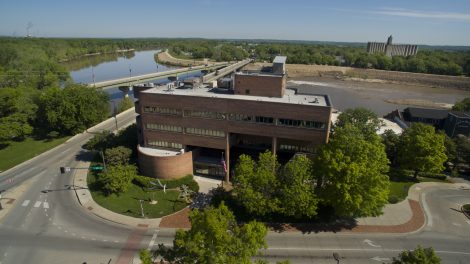New comprehensive plan calls for reintroducing businesses into Lawrence neighborhoods

photo by: Nick Krug
Lawrence City Hall, 6 E. Sixth St., is pictured on May 3, 2016.
Lawrence residents could soon find that their newest next-door neighbor is a business.
Instead of being relegated to strip malls and the city’s commercial districts, small businesses such as coffee shops, restaurants and professional offices could soon be able to locate within the neighborhoods they hope to serve. Integrating businesses into neighborhoods — mostly a relic of the past seen in the city’s historic downtown — is part of the city’s newly proposed comprehensive plan, Plan 2040, which will cover growth and development in the community for the next 20 years.
Planning Manager Jeff Crick said the idea was to try to bring back appropriate businesses to neighborhoods and give residents more options within walking distance. Crick said some examples of appropriate businesses included grocers, coffee shops, restaurants, gas stations or professional offices, such as insurance agents or dentists.
“One that was used quite frequently was a small grocer, or something that would serve a neighborhood purpose,” Crick said, “where if you just needed to run down to the corner to get a paper or a carton of milk, you would have the option, instead of having to get in your car and then drive to a larger commercial center. What they were trying to get toward was neighborhoods being a little bit more inclusive of your daily needs.”
The goal, to “provide opportunities for small neighborhood retail,” came from the Issue Action Report that the comprehensive plan steering committee used to create Plan 2040. The report was based in part on feedback gathered from residents, neighborhoods and other local groups.
Reintroducing businesses
The plan provides a framework for reintroducing businesses to neighborhoods, but how those changes will be implemented won’t be decided until local governing bodies make related changes to code. The plan does note that such businesses should be both neighborhood- and pedestrian-scale. Once the plan is approved, Crick said, the City Commission, Douglas County Commission and the Planning Commission will discuss development code or other changes.
Lawrence Association of Neighborhoods Chair Courtney Shipley, who is also a City Commission candidate, said that LAN did not object to having businesses in neighborhoods. However, Shipley said it would be key that regulations related to neighborhood commercial addressed appropriate scale, as outlined in Plan 2040.
“The questions for the neighborhoods are always how disruptive or what scale those businesses are,” Shipley said. “Nobody seems to mind if there is a hairdresser in their neighborhood. It doesn’t create a lot of traffic, it doesn’t create a parking problem, it’s not disruptive to the children that might be in the neighborhoods. It’s when you get to larger scale things.”
In addition to scale, Shipley said that other general issues of concern for neighborhoods included parking, traffic and general appropriateness for the area, and that it was important for neighborhoods to have an opportunity for recourse if issues arose. However, Shipley noted there are already some examples of successful neighborhood businesses — such as 1900 Barker Bakery and Cafe and the Sunrise Project — and that neighborhoods don’t want to be a hindrance to those innovations and the opportunity for entrepreneurs.
“Obviously we have some examples of where stuff like that has been successful, and neighborhoods want to be part of what the successes are and they want to encourage that,” Shipley said.
A new focus
Crick said several “actions items” in Plan 2040 related to neighborhood commercial. Under small neighborhood commercial, the plan calls for encouraging neighborhood-scale commercial uses that are integrated into residential areas; supporting mixed-use development when contextually appropriate; and encouraging appropriate development and redevelopment of local commercial areas to serve existing and future neighborhoods.
Under the neighborhoods and housing chapter, items include integrating small or large neighborhood commercial options into neighborhood designs and ensuring commercial development integrates multiple modes of transportation and connections to surrounding neighborhoods. In addition, Crick said residential businesses supported the plan’s goal to design neighborhoods to accommodate aging in place.
Crick said the neighborhood commercial items in Plan 2040 represented a new focus when compared with the current plan, Horizon 2020. Specifically, Crick said that though Plan 2040 continued to have sections that addressed major commercial areas such as downtown, South Iowa and 23rd Street, that the inclusion of neighborhood commercial attempted to provide additional options for the community.
“It’s trying to not focus solely on one of those big commercial areas, but trying to find what really works best for neighborhoods, people trying to get into the market, or even a business that would like to open a satellite,” Crick said.
The Lawrence City Commission voted at its last meeting to defer adoption of Plan 2040 in order to change wording of the plan’s growth policy, which has been controversial with some local groups. Commissioners have not voiced any objections to the provisions in the plan related to the reintroduction of businesses into neighborhoods. Once the commission adopts the plan, it will move to the County Commission for review. Changes made by either body then go back to the Planning Commission.






